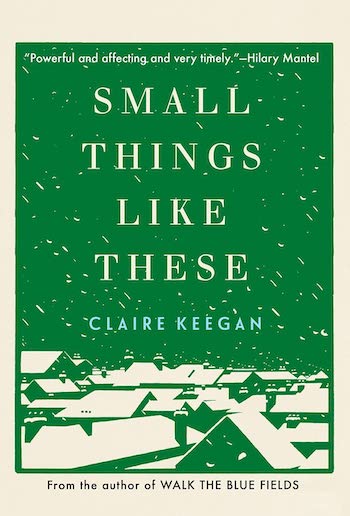Book Review: “Small Things Like These” — Resisting Cruelty
By Lucas Spiro
Claire Keegan’s novella expertly shows how the culture of idle talk in certain Irish communities is like a secret code — an intricate language that both obscures and reveals.
Small Things Like These by Claire Keegan. Grove Press, 128 pages, $20.
 There has been an unforgivably long delay between when my editor asked for my evaluation of Small Things Like These and its delivery. (The book was published at the end of November.) That’s because I was searching for different ways to review Claire Keegan’s latest novella. But the unfortunate truth is that there is only one way to approach this book: with the realization that ordinary life in Ireland is so appalling that justice demands that books like Keegan’s be written.
There has been an unforgivably long delay between when my editor asked for my evaluation of Small Things Like These and its delivery. (The book was published at the end of November.) That’s because I was searching for different ways to review Claire Keegan’s latest novella. But the unfortunate truth is that there is only one way to approach this book: with the realization that ordinary life in Ireland is so appalling that justice demands that books like Keegan’s be written.
During 2021 we learned that upwards of nine-thousand Irish children died in the so-called “mother and baby homes.” These were institutions used by both church and state to hide, abuse, and extract labor from more than fifty-thousand single, pregnant women between 1922 and 1998, when the last of these “homes” closed. Many of these children had been “adopted” — trafficked really — without their mothers’ consent. A commission charged with issuing a major government report on the crime faced a public backlash when it was discovered (after it was unceremoniously leaked before publication) that the recorded testimony of around 550 survivors had somehow been deleted. (It was later determined that the recordings could be retrieved from backup storage.) Official indifference to the voices of victims could not have been more blatant — or infuriating.
There was more news of ingrained misogyny over the past year. Domestic abuse reports against women (and some men) skyrocketed because of pandemic lockdown measures. A redress scheme for survivors of the mother and baby homes has been soundly criticized because of everyone it leaves out. It has been reported that Ireland has only a third of the refuge centers it needs. And, on January 12 of this year, a twenty-three-year-old woman was murdered while jogging along a typically well-populated stretch of the Grand Canal in County Offaly at four o’clock in the afternoon. The stretch of canal where she was murdered is named for another woman who went missing and has never been found.
Irish authors continue to return to the subject of systemic abuse against women in what was a near-theocratic state because the history of violence and coercion is far from over. Women live with an ever-present threat of brutality. There is a growing demand that the future be different. Keegan’s book was published nearly two months ago, but this week I noticed it occupied an entire window display of the bookstore around the corner from my office, displacing Sally Rooney’s latest.
The narrative is set against the backdrop of mid-’80s New Ross, County Wexford, an inland port town on the River Barrow in southeast Ireland. Protagonist Bill Furlong is a respected pillar of the community, the local coal merchant, the owner of an essential business. As the Christmas holiday approaches, economic routines, not domestic relationships, are uppermost in his mind.
Always it was the same, Furlong thought; always they carried mechanically on, without pause, to the next job at hand. What would life be like, he wondered, if they were given time to think and to reflect over things? Might their lives be different or much the same – or would they just lose the run of themselves? Even while he’d been creaming the butter and sugar, his mind was not so much upon the here and now and on this Sunday nearing Christmas with his wife and daughters so much as on tomorrow and who owed what, and how and when he’d deliver what was ordered and what man he’d leave to which task, and how and where he’d collect what was owed – and before tomorrow was coming to an end, he knew his mind would already be working in much the same way, yet again, over the day that was to follow.
He is all middle-class responsibility, a man living a modestly comfortable life as businessman, husband, and father to three daughters. But Furlong finds himself approaching a mid-life crisis with moral and social implications. He stumbles on the culture of complicit silence that has protected the local convent and its treatment of unwed pregnant girls. His decision to intercede or not risks familial and financial stability — he must choose to act, with no guarantee of success, or to keep mum and carry on.
During a chance early-morning delivery to the convent Furlong discovers one of the girls locked in the coal shed. “He judged, by what was on the floor, that the girl within had been there for longer than the night.” Furlong takes her inside and the nuns do their best to cover over what Furlong is trying hard to deny, anxious to get along. On a previous visit he’d already stumbled upon “a small, lighted chapel where he found more than a dozen young women and girls, down on their hands and knees with tins of old-fashioned lavender polish and rags, polishing their hearts out in circles on the floor.” A girl whose “had been roughly cut, as though someone blind had taken to it with shears, approaches him and pleads, “Mister, won’t you help us?” Furlong impotently replies, “It’s not up to me girl, I can’t take you anywhere,” and shows “her his open, empty hands.”

Author Claire Keegan — a master of her craft. Photo: Cartier-Bresson
Ironically, Furlong’s life might have been radically different had it not been for the intervention of his mother’s employer. “Furlong had come from nothing. Less than nothing, some might say. His mother, at the age of sixteen, had fallen pregnant while working as a domestic for Mrs Wilson, the Protestant widow who lived in the big house a few miles outside of town.” After his mother’s sudden death, Furlong is more or less raised by Mrs. Wilson. “He’d a head for business, was known for getting along, and could be relied upon, as he developed good Protestant habits; was given to rising early and had no taste for drink.” His father, registered as “unknown” on his birth certificate, escapes all accountability. The traditional authority of familial patriarchy is displaced by a defanged Anglicized upbringing, inscribed on the landscape of the post-colonial state. Combined with the inherited institutions inflected by Catholic social teachings, this history empowers an economic hierarchy indifferent to suffering as it professes a doctrine of social responsibility.
The conventional wisdom about the convent is that “a good half of what was said could not be believed; never was there any shortage of idle minds or gossips about town.” Keegan expertly shows how the culture of idle talk in certain Irish communities is like a secret code — an intricate language that both obscures and reveals. Furlong tries to bring up the distressing visit with his wife, Eileen, whose response is to become “rigid,” responding that “such things had nothing to do with them, and that there was nothing they could do, and didn’t those girls up there need a fire to warm themselves, like everyone? And didn’t the nuns always pay what was owing and on time unlike so many.” Furling presses, wanting to know what Eileen knows. “There’s nothing, only what I’m telling you” and “If you want to get on in life, there’s things you have to ignore, so you can keep on.”
Keegan’s story is open to criticism because Furlong is the only person in the story who, when he learns the truth, acts courageously. He recognizes his ethical duty through his agency “as a man amongst women.” The narrative focuses on individual rather than collective action, though the protagonist is rebelling against a national silence, driven by Catholic social teaching and government inertia. There are brief mentions of Thatcherism, neoliberalism, and widespread poverty, but Ireland’s postcolonial corporatist situation is unique in its isolation from — though still linked to — global economic trends. The truth is, Keegan has little interest in abstractions or theory. Furlong’s impetus to act is the result of self-reflection, a characterization of traditional authority – more overt, less diffuse – as a precondition to the formation of a revolutionary subject.
Small Things Like These is a moral tale, but Keegan does not patronize or preach. She is a master of her craft; there are no wasted words. The delicate handiwork of this slim text is one of its strengths. One false word, feeling, or sound would betray the reader’s trust. That would turn the novella into just another dogmatic “Irish book” about abuse and Catholicism and crushing provincialism. She chooses to punch the reader’s gut, bypassing the twisted routes of intellect. With admirable efficiency, Keegan issues a storyteller’s humble (and primal) invitation — to stop wanton and systematic cruelty. Furlong acts out of pure feeling, not because he’s a hero, but because he is human.
Lucas Spiro is a writer living in Dublin.
Tagged: Claire Keegan, Grove-Press, Ireland, Irish Literature, Lucas Spiro
